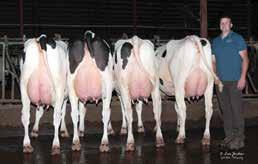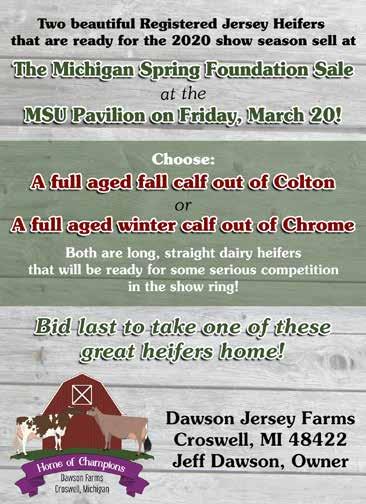
38 minute read
MMPA Farmers Take Home 45% of National Milk Quality Awards
Brenhaven Big Guns
Born 12.20.19
Sire: Brenhaven Blackies Big Gun
(Hired Gun X Miss Sambo Black Gold EX 95) We have Big Gun Semen Available
Dam: Ratliff Tequila Aquire EX 90 Best record: 4-08 296D 2x 18,420M 6.1% 1129F 4.0% 731P 2nd Dam: Ratliff Jade Ainsley-ET 3rd Dam: Bridon Ethan Almond EX-91 Maternal Sister to Ainsley (2nd Dam): Ratliff Price Alicia EX-95 • Supreme Champion, NAILE 2009 & 2010 • National Grand Champion, BU & BBO of Show, All-American 2009 & 2010 • All American 5-Year-Old ‘10 • Grand Champion KS State Fair 2009 & 2010 • All American 4-Year-Old ‘09 • Res. Grand Champion Central National ‘09 • 1st 4-Year-Old, BU, BBO * Production Award, Central National ‘09
BRENT ROBINSON • BRENT MOYER • CARO, MICHIGAN • 989-553-4333 • BREN_HAVEN@YAHOO.COM
I will be attending & am happy to assist anyone in any way.
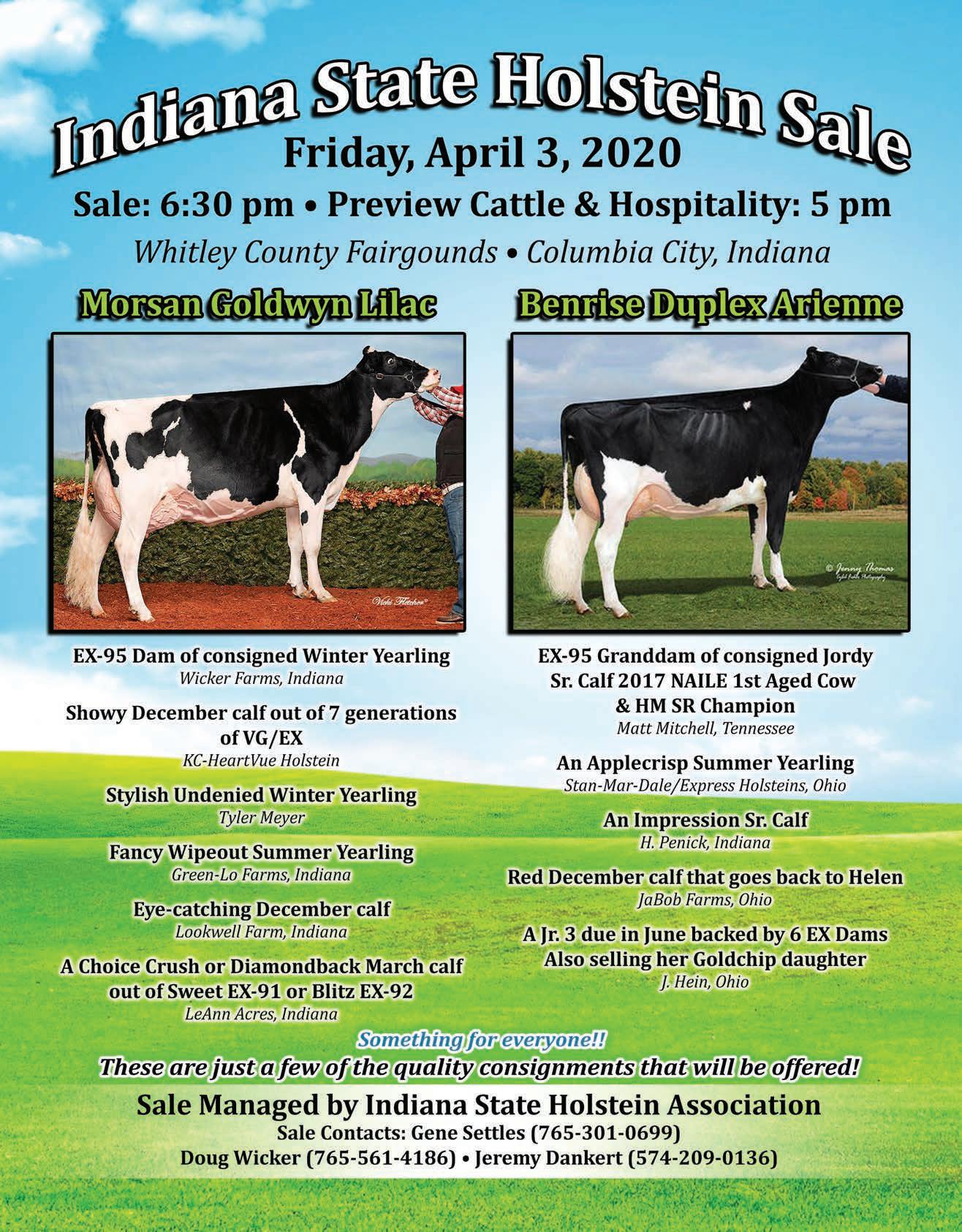

15Spring 2020 Michigan Dairy Cattle News By Bev Berens
Turning the farm over to the next generation is hard. It is not like a typical estate where everything is turned to cash and split among family. Farming is capitol intense. Assets like land and homes have sentimental attachments beyond family members operating the farm.
Sometimes, there simply is no second generation to bring into the farm business.
According to Roger Betz, MSU Extension, 70% of family owned businesses do not survive the transition. Family discord or procrastination and lack of planning leads to disaster.
Attorney Steven Tjapkes, who is also a farmer and veterinarian, discusses aspects of farm succession planning with Michigan Dairy Cattle News. Three Michigan farm business add comments from their perspective. The Farms
Rodney Daniels operates a 530- cow dairy in Whittemore with his two brothers, nephews and daughter. Daniels has made a successful transition from his parents to he and his brothers. He now wants to bring his daughter into an ownership position. The farm milks 3X per day in a double 9 herringbone parlor around the clock. They are building a robot barn to control costs and eventually plan to add a second robot barn.
Geert and Gertie Van den Goor operate Goma Dairy in Marlette. With no family interested in taking over the business, the Van den Goors reached out to friends Brent Moyer and Brent Robinson, owners of Pinnacle Genetics in Caro as successors to their business. Together they formed Green Point Dairy, LLC., that will allow two successful businesses to merge into one 10,000 head business over time, ensuring the long-term viability of each farm, and capable hands to carry on a business. Where do you start the succession plan? Tjapkes: The process begins by taking inventory. The current quality and adequacy of equipment and technology is done to see if the farm is up to date or if there are deferred purchases or excess deferred maintenance. If the equipment is out of date or in need of much repair, that will absorb cash flow for the transition process. In addition to an inventory of equipment and assets, there needs to be an inventory of personnel determining if there are business managers and technical people in place to keep the farm running into the next generation. What are some pitfalls and how do you address them? Tjapkes: The two key pitfalls that I see most commonly are a failure to agree on a common goal and a failure of cash flow. The failure to agree on a common goal can frequently appear in the generation of current owners. One owner may have a goal of keeping the farm operational and in the family at all costs, while the other current owner may have a goal of treating all children equally. This disjunction of goals can derail a succession plan in a big hurry. The second large challenge is that of cash flow. This is most significant on smaller family operations. Once the existing ownership wishes to transition and retire, the next generation is trying to find a way to both replace that lost labor (which comes at a cost) and a means to generate income to pay for the farm. Often this issue necessitates a substantial change in the type of farming operation. Daniels: Our daughter’s husband has his own farm. He doesn’t want our financials to impact him as we are making this expansion. Keeping other family businesses from being impacted. Van den Goor: Not starting early enough. We took a more European approach and are allowing 10-15 years for the transition plan to take place. Robinson: When the incoming generation wants to take over so badly that the senior generation allows bad judgement despite consequences.
From an attorney standpoint, one partner exits easily while others struggle. Any advice? Tjapkes: How easily an existing owner can exit is dependent upon a couple of factors. The first factor is when that owner does not wish to retire no matter what. As I draft various documents or present legal strategies for an exit, often, they are all rejected by the current ownSUCCESSION PLANNING ROUND TABLE Advice on Managing the Transition No One Wants to Talk About “Start planning when you need to, like when you are bringing in another partner. We’ve done what our accountant has told us to do. He is a third party and not emotionally involved. That eliminates any one party dictating how things are going to go.” Rodney Daniels
16 Michigan Dairy Cattle News Spring 2020 er, not for any legal reason, but simply because the current owner doesn’t want to engage in a succession plan. In addition to the personality of the owner, the available assets for transition are a key element in a successful exit strategy. Persons who have planned and have life insurance in place to satisfy non-farm children or persons whose non-farm spouse have engaged in careers with some form of retirement benefits makes the transition much easier.
When do you start succession planning? Daniels: Start planning when you need to, like when you are bringing in another partner. We’ve done what our accountant has told us to do. He is a third party and not emotionally involved. That eliminates any one party dictating how things are going to go. Van den Goor: Start early, the earlier the better.
How do you determine who is going to run the books and keep the other partners informed financially within the business? Tjapkes: The issue of bookkeeping is one that frequently arises. As we move from one generation to the next, oftentimes the bookkeeper is the spouse of the operator or an old family friend working from their basement. This sort of bookkeeping is often inadequate to deal with the transition from farming as a sole proprietorship to farming in an entity structure with multiple owners. I find it best to begin by bringing in an outside experienced agricultural accountant. I also encourage all the entity owners to attend annual meetings with the accountant. The presence of a third party, professional keeping track of the books and records is essential for a smooth transition. Daniels and Van den Goor: Based on who has the correct skill set for an ever-evolving job. After a transfer of the operation, the younger generation must provide a living for the older generation. How do you make sure you’re taking care of the senior partners but not breaking the younger generation? Tjapkes: Providing adequately for the older level of ownership while maintaining enough cash flow for a successful operation is the central business challenge to any family farm transition. Traditionally, on smaller family farms, the older generation simply lived on the farm, had their basic needs met from the farm and continued to work as much as their physical strength allowed. The concept of the current farm ownership retiring and having a separate maintenance is relatively new. Often, the only way to increase the amount of profit is to increase the size of the entity in such a manner that there is adequate cash flow for the senior level. Other methodologies to adequately provide for the senior exiting partners is to generate liquidity by selling off unprofitable assets or starting ancillary businesses. If the senior level or selling level of ownership has the assets then the loan documentation can allow the senior level to toggle the loan back and forth between full payments, interest only payments and suspended payments. This ability allows the entity to survive in down market. Moyer: The transition needs to be gradual beginning with cows, then equipment and finally land and buildings. Expecting all the money for a business built over a lifetime is unrealistic. Daniels: That is why we are expanding, so we can create the needed income for everyone. Van den Goor: There must be no losers in the deal, everyone must be a winner in the deal.
How do you deal with the feelings of family members both within the partnership and those who may not be involved in the business? Tjapkes: The important item to keep in mind is clear and open communication. While it is impossible to prevent all levels of hurt feelings, it is possible for the current ownership to make it known to the family what their goals are for succession planning. If the current owners are clear in their desire to transition a farm from one generation to the next, which may entail part of the family not receiving an inheritance, that needs to be spelled out clearly and early in the process. If more than one member of the family is being involved in the farm in the next generation, it is also important that the role those children will play in the future operation be set out in advance. Good communication can’t prevent hurt feelings, but it can get all the issues out on the table so that the feelings can be managed to the best extent possible. Daniels: I view it as a business and the business must survive.
Is there additional professional assistance that needs to be part of the process? Tjapkes: In any good transition program, the attorney, the accountant, a business appraiser and, if warranted, an Succession Planning Round Table “The transition needs to be gradual beginning with cows, then equipment and finally land and buildings. Expecting all the money for a business built over a lifetime is unrealistic.” Brent Moyer
Spring 2020 outside investment consultant should all work together on the plan. This team approach coordinates the legal, tax and value challenges all at once.
Where do family members who are not part of the business fit in and how can they be addressed equitably once the senior partners have passed? Tjapkes: For family members not involved on a full-time basis, I have found that they can be participants in the enterprise that owns the real property. The entity that owns the real property can generate some return by the receipt of land rents and it is that part of the operation that has the best chance of future appreciation. This allows family members to be involved without participating in the operational entity.
How difficult is it to find someone you can trust? Van den Goor: Because we had no family who was interested in taking over the farm business, we turned to friends who we feel do an excellent job with their business and by combining the two, we know that what we have built will continue and can add to their long term success as well. Moyer: The biggest risk we have in this is losing a friendship. Fortunately, so far, our management styles are very compatible and the transfer and sharing of responsibilities has been smooth.
What about tax ramifications? Tjapkes: The tax ramifications of business succession need to be managed very carefully. The sale of equipment from one generation to the next is treated very differently than the sale of other assets from one generation to the next. Additionally, land that is inherited by reason of the first generation dying, can receive a step-up in basis. Therefore, it is often necessary to break a transition down into different steps to manage the tax consequences. Daniels: It hasn’t been too bad. What happens if the farm goes broke? What kind of guarantee that mom and dad will still get paid? Tjapkes: If the farm can no longer make the payments to the first generation, I make certain that the existing generation has kept ownership of the land. By saving the land to the end of the transition process, the most valuable asset can be retained in the current generation. If the land needs to be sold as part of the transition process, or to generate cash flow for the transition, I make certain that a mortgage has been filed.
What happens when the younger generation wants to take vacations and the parents think they should stay there and work like they did? Tjapkes: The issue of intergenerational work ethic has been around since the dawn of history. Most generations feel that the generation coming up behind “Because we had no family who was interested in taking over the farm business, we turned to friends who we feel do an excellent job with their business and by combining the two, we know that what we have built will continue and can add to their long term success as well.” Geert & Gertie Vanden Goor them does not have the work ethic they did. Sometimes, this is true and other times it is only a perception. Therefore, I like to begin the transition process in slow stages where the expectations of work are clearly laid out. In this manner, if only a little bit of transition occurs, and there really is a problem with the younger generation not paying enough time and attention to the farm, the process can be more easily unwound.
Do you have some standard advice to share to all parties entering this process?
Tjapkes: The advice I begin the process with to all clients is for them to take a moment to honestly assess their goals and to realistically assess the financial situation. The financial realities of a family situation will dictate what can and cannot be accomplished. I also advise each family that everybody’s situation is different and not to listen to the story from your neighbor and think that your farm can transition in exactly that same way. Being flexible is a key to success.

The ad deadline for the summer issue of Michigan Dairy Cattle News is May 10.
‘Whenever We Win, We Win Together’ Reed Sisters Receive Outstanding Young Breeder Award
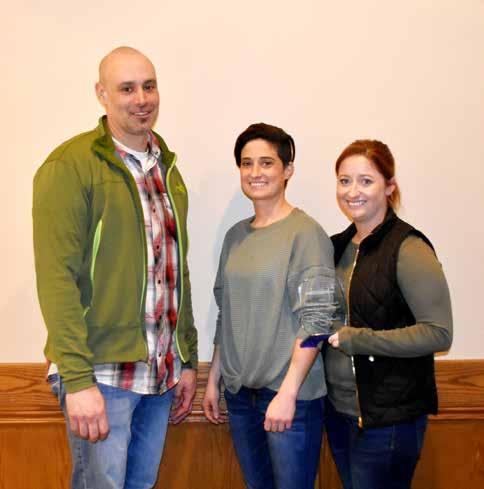
18 Michigan Dairy Cattle News Spring 2020 By Bev Berens
If the honor of receiving Michigan’s Outstanding Young Breeder Award wasn’t enough, keeping all the Michigan Holstein Association breeder recognition awards in the family will make 2020 one to remember for the Reed Family.
“It is fitting to all win in the same year,” said Malissa after she and her sister Liz were named Outstanding Young Breeders and their father named Master Breeder at the Association’s annual meeting. “What we do is very team based. We know our roles and whenever we win, we win together.” She continued, “Liz and I are both surprised. It is pretty exciting to see people appreciating what we’ve been working for and it is very cool that we can get there together.”
The sisters learned a breeding philosophy from their father and continue that when selecting matings—type over index, style, balance, good feet and legs. They continue learning by experience and from their peers and have a goal of building a larger facility for their heifer raising program which would allow them to expand their show string.
One of Liz’s favorite cows is ReedEli Lawnboy Tigerlily-Red, the first cow she bred with her own prefix. The cow contracted blackleg, but Liz was able to help bring her back to health and production. That event solidified that she wanted to be on the farm with cows, full time.
Malissa, a genetic specialist, has had a lot of luck with SJ-Reed Atwood Symphony, an EX-90 Atwood out of a VG-88 Jasper. “She is a black, silky-hided, nice-uddered cow and produces the same in her offspring,” she said.
The sisters learned early on that feeding is most important in raising good animals, and especially for the show ring. Protein to get the growth, energy to for fuel, and in the right combination. “The animal’s success is 80 percent environment and 20 percent genetics, and to get the value out of the genetics, you have to get the right nutrition,” Malissa said.
They credit many people for helping them gain skill, knowledge and confidence. Their parents, Steve and Elaine, Joe Domecq, Jess Jakubik, Brent Moyer, Moss McCauley, Tim Baker, Kenda Brinks and Todd Watts have shared their support and knowledge freely.
Malissa’s advice for others working with family is to stop competing against each other. “Find your role and complement each other in your individual strengths to make your farm and cows the best possible.” Reed Sisters, Liz (center) and Malissa(right) were presented with the 2020 Wayne Webster Memorial Outstanding Young Breeder Award by the 2019 winner, Brent Moyer, at the recent Michigan Holstein Association Annual meeting.
The “aAa” Breeding Guide has been around since 1950, which means it predates linear traits and ranking indexes as well as Genomics. It is widely misunderstood in that it is not “another form of genetic selection” that would replace what you use currently for choosing mating sires, but is a “guide to how to harvest the best results from genetics” by its precise knowledge of how physical form and function are inherited.
“aAa” takes the bulls you wish to use, and guides you in matching them to your cows most capable of complementing their strengths and avoiding their weaknesses. “aAa” use results in more “balanced” cattle in the only way that matters – a physique capable of all desired functions, able to thrive in any physical and nutritional environment. This means easier calving, more consistent in performance, more uniform in growth rates and size, better use of homegrown forages, and longer functional lives (allowing you to capture higher mature cow yield levels).

Let us assume that, as a survivor of the recent four years of economic trauma, you are determined to stay viable in the dairy business. In this, you have heard the old saying: “insanity is to keep doing the same things over and over, while expecting a different result.” Cattle breeding in the popular way is like that – the longer you do it, the less it does for you. Too often it reverts to “inbreeding depression”, an effect proven by research to result from “likes to likes” matings for too many generations. Popular genetic selection produces faster maturing heifers, but also faster aging cows, so your replacement costs remain higher than optimal. It becomes an expensive treadmill.
Thus, if you have been resisting a try at “aAa”, not understanding what it means, but are not fully satisfied with the cattle you are getting, consider a visit with me so I can demonstrate what “aAa” breeding guide really can do for you. Start out by visiting the “aAa” website at www.aAaWeeks.com, then give me a call.
P: (989) 277-6031
Greg Palen (trained and approved by aAa since 1994)
F: (989) 834-2914 E: greg@michiganlivestock.com
Steve Reed (right) of Owosso is the 2020 MHA Master Breeder Award recipient. He was presented with the award at the recent Michigan Holstein Association annual meeting by last year’s winner, Darwin Sneller(left).
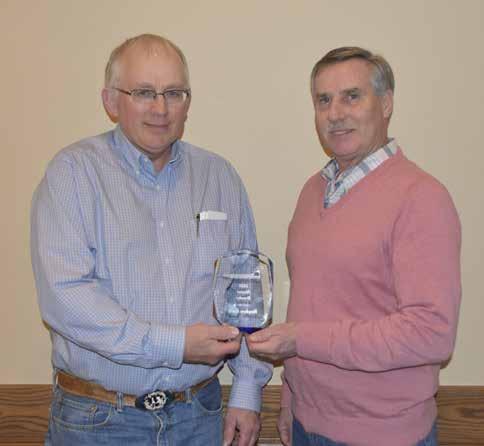
20 Michigan Dairy Cattle News By Bev Berens
Steve Reed of Owosso was named the 2020 Master Breeder for Michigan Holstein Association at their annual meeting in February. Steve and his wife Elaine have four children: Karreen Bird, Elizabeth, Malissa and Earl Reed. “I am so surprised, the award is completely unexpected,” Steve said. “There are a lot of people who have deserved this award over the years, and it is so exciting to be among them.”
The Reed farm was started in 1945 by Earl and Isabel Reed who bought 25 Holsteins and 456 acres in Owosso. The farm grew to 100 cows with the help of his sons Dennis, Ken, Martin, Steve, David and Pat.
Reed joined the family farm after graduating from the MSU Ag Tech Dairy program in 1980. At the same time, he took a sales position with Michigan Animal Breeders Cooperative. Shortly after, he moved into a genetic consultant position. In 1981, he bought his first registered Holstein, Arc Bell Gypsy. In 1994, the Reed brothers built a new parlor and expanded to 200 cows. Ten years later, they were milking 300 cows in a double twelve herringbone.
The lure of showing cattle beckoned the family when Karreen was old enough to enter the ring. Together, Steve and Karreen took their first excellent cow, SJ-Reed Special Choice to the fair. She was an EX-90 Mark Adam out of an 81-point Blackstar. They continued to improve genetics and began showing further from home.
One of Steve’s favorite cows is RiVal-Re Adv Sushi-Red-ET who won grand champion of the All-Michigan Red and White show in 2010. She was an EX-91 Advent out of an EX-90 Red Marker from Golden Oaks Serenity-Red EX-91. Another is a homebred cow, SJ-Reed Ladd Sylvia-Red EX-92, a Ladd-P daughter from the Sushi-Red family. She was the supreme champion of the All-Michigan show in 2016. She is now EX-92 EE and has produced promising daughters. Sylvia placed third as a 4-year-old at the Red and White show in Louisville.
Developing and showing cows has become a family event with daughters Elizabeth and Malissa, who are fully involved with breeding their own line of superior cattle at the farm. Friends have helped along the way and all share the winner’s circle together. Jess Jakubik, Brent Moyer, Tim Baker and Todd Watts are just a few of the friends who have made showing and breeding great cattle so enjoyable.
“I have to thank my wife Elaine, she has put up with a lot,” Steve said. “While the girls and I are off showing somewhere like Louisville, she might take a vacation up north.”
Reed’s breeding philosophy is more about production, type and udder composite than high indexing cattle, and a balance of those traits make for a profitable, well-balanced herd. “I hate ugly cows,” he said. “Don’t keep having those genes in your barn, it is a self-fulfilling prophecy, ugly ones continue to produce ugly cattle.”
Steve has been a member of the Michigan Holstein and National Holstein Associations for 40 years. He has served as a board member, director at large, National Convention delegate and sale committee member.
Reed has gained respect for many breeders he has encountered over time. Some favorite pieces of wisdom that have become part of his philosophy and that he instills in his daughters: “Everything is for sale. Money does not get mastitis.”
Tim Hood Named 2020 MSU Dairy Farmer of the Year
Spring 2020 EAST LANSING, Michigan – Tim Hood, who along with his wife Debbie own and operate Hood Farms Family Dairy, received the 2020 MSU Dairy Farmer of the Year Award.
The award is given by the Department of Animal Science at Michigan State University (MSU) and was presented at the 2020 Great Lakes Regional Dairy Conference in Frankenmuth, Michigan.
Hood Farms Family Dairy, located in Van Buren County, was established in the 1890s and transitioned to a dairy farm in the 1940s. Today, the farm includes more than 1,000 acres of corn, soybeans, alfalfa and wheat crops primarily used as forage. Tim grew the dairy from 50 milking cows to 500 cows and over 400 youngstock today. He transitioned the operation from a tie-stall barn to a fabric-covered freestall barn with a double 15 parallel parlor. Several members of the Hood family are involved in the operation: Tammy (Hood) and Ty Spicher, Charlie Hood, Britney Hood, Jennifer Buskirk and four grandchildren.
Tim places a priority on working to sustain the dairy industry. Hood Farms Family Dairy has twice hosted MSU Extension’s Breakfast on the Farm, which allows the public to see a working farm up close and to learn about modern agriculture.
“I see people drive slowly by the farm trying to get a look inside. I know they are curious,” Tim said before the 2015 event. “Many consumers don’t understand modern-day farming practices, and it is important that they know our story.”
Thousands of attendees attend Breakfast on the Farm each year, and Tim’s willingness to invite such a large
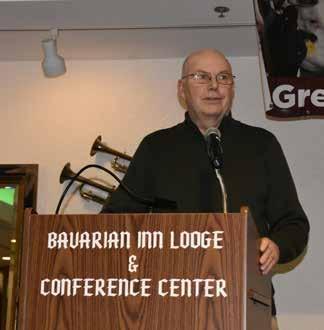
21Michigan Dairy Cattle News crowd onto his property was not only a sign of genuine transparency but also a desire to communicate his dedication to farming.
“If you ask him what he loved most about Breakfast on the Farm, it would be seeing the faces of people and their excitement to walk through the barns being able to learn about cows and agriculture,” Tim’s Dairy Farmer of the Year anonymous nominator said.
Tim is a member of several dairy industry leadership and promotional organizations. He is District 2 director of Michigan Milk Producers Association (MMPA) Board of Directors, representing over 200 farms in Michigan and Indiana. He served on the MMPA Advisory Committee from 1998 to 2005. He also serves on the United Dairy Industry Association Board of Directors, the Michigan Dairy Market Program Committee, the United Dairy Industry of Michigan Board of Directors and the Michigan Farm Bureau Dairy Advisory Committee.
Tim’s priority on sustaining the dairy industry is illustrated through his involvement with MMPA. Through MMPA’s involvement with the Michigan Alliance for Animal Agriculture (M-AAA), Tim reviews M-AAA research proposals from faculty at MSU on behalf of MMPA and makes recommendations for funding. M-AAA is a partnership between the state’s animal agriculture industries and MSU focused on advancing the Michigan animal agriculture economy.
Tim was honored for 35 years of membership in MMPA in 2012, and he was a District 2 finalist for MMPA Outstanding Young Dairy Cooperator in 1996-1997. In addition, the farm was recognized with the MMPA Bronze Quality Award in 1998, 2009, 2012, 2016 and 2018.
“This is a family farm and we take care of our animals,” Hood said in 2015. “They are clean and comfortable in their freestalls. We take care of them because they are our livelihood.”
As Hood Farms Family Dairy has evolved through the years, so has Tim’s role. He still arrives at the barn early, asking team members about their day and checking on the well-being of the cows. He’s also focused on moving the farm into the future, which means guiding the next generation on what it takes to make the dairy run successfully.
“Tim Hood is an inspiration for all dairy farmers and a great example of how dairy farms are integrated into their communities,” said Dr. Pam Ruegg, Chair of the Department of Animal Science. “It is with great pleasure that the MSU Department of Animal Science recognizes Tim Hood as the 2020 MSU Dairy Farmer of the Year.”
Judge: Brandon Ferry; Hilbert, WI

1. ELIGIBILITY: All animals exhibited at shows must be accompanied by the registration certificate from their respective breed no photo copies of registrations will be accepted. Ownership shall be established by the name on the certificate of registry or the presentation of the certificate of registry along with a signed and completed transfer and fee, which will be forwarded to the respective association. Each Holstein animal must be at least 87% -RHA. 2. JUNIOR MEMBERS: Junior members must have project animals registered in their name and they must show their animal, or have another junior member show their animal to compete in the junior division and to qualify for the junior ribbons in the class. Show Ownership - Animals two years and over must be prior to January first of the year shown. Ownership of animals less than two years old must be prior to June first of the year shown. All animals exhibited in showmanship must be owned by the junior showperson.
3. YOUTH CLASSES: Youth classes include 1,2,3,4,5,6,8,9,10,11,12,13,14,15,16,17 and 18. The Junior and Reserve Junior Champion will be selected from the first and second place winner from classes: 1,2,3,4,5, and 6. The Intermediate and Reserve Intermediate Champion will be selected from the first and second place winners from classes 8,9,10,11 and 12. Senior and Reserve Senior Champion will be selected from the first and second place winners from classes 13,14,15,16,17 and 18. Grand and Reserve Grand Champion will be selected from the Junior, Intermediate and Senior Champions.
4. HE ALTH CERTIFICATES: Michigan official Health Rules must be observed. All cattle exhibited must be free of contagious and infectious disease including extensive ringworm, scab, mange, and warts. Cattle under quarantine are not eligible for exhibition. All decisions regarding health of any animals shall be made by the official veterinarian and implemented by the show chairman. ALL CATTLE MUST HAVE AN OFFICIAL RFID TAG.
5. DHI RECORDS: It shall be the responsibility of each exhibitor to make available all registrations, health or DHI sheets.
6. SHOW AUTHORITY: The Show Committee, Michigan Holstein Association and the Michigan Ayshire, Brown Swiss, Geurnsey, Jersey Red & White Cattle Club(s), its agents reserve the final and absolute right to interpret the rules and regulations of the show and will settle all matters in connection with the show.
7. EXHIBITORS: All show people are encouraged to display a standard exhibitors card harness with class number clearly visible, and are encouraged to wear white pants/jeans or skirt.
8. POINT SYSTEM: The point system for determining Premier Breeder and Premier Exhibitor Awards shall be as follows:
Placing 1st 2nd 3rd 4th 5th 6th 7th 8th 9th 10th Jr. Females, Dry Cows 10 9 8 7 6 5 4 3 2 1 Sr. Females 20 18 16 14 12 10 8 6 4 2 9. PREMIER BREEDER AWARD: The Premier Breeder award is presented to the breeder of no more than 6 animals, all shown in the single classes, which total the most points. No entry is required and the winner need not be an exhibitor at the show nor the owner of the point-winning animals. BREEDER DEFINED: The owner of the dam at the time of service shall be considered the breeder. Where animals are registered in the names of different members of a family residing on one farm and where the herd is one unit, all animals shall be considered bred by that unit.
10. PREMIER EXHIBITOR AWARD: The Premier Exhibitor award is presented to the exhibitor of no more than six animals. all shown in the single classes, which total the most points. EXHIBIT OR DEFIN ED: The exhibitor must be the owner or member of a partnership owning the animal. Where animals are registered in the names of different members of a family residing on one farm and where the herd is one unit, all animal may be considered exhibited by that unit.
11. SUBSTITUTIONS: Substitutions may be made both in and out of respective classes. Changes must be made before the close of entries.
12. FIRST BRED AND OWNE D: First place bred and owned animals will be recognized for the highest placing animal bred and owned by the exhibitor, as determined by registration certificate. Breeder is to be determined as the owner of the dam at the time of service; where a herd is registered in the names of different members of a family residing on one farm, where the herd is one unit and everyone is using the same prefix, all entries may be considered as Bred and Owned by Exhibitor.
13. DRY COWS: Entries in dry cow classes must have produced a live calf within 18 months or prove to be with calf. A cow shown dry must have been reported dry on DHI records or any cow that was last fresh 280 days or more, prior to the date of the show, may be shown at the option of the exhibitor in either the dry or milking cow class. The DHI sheet must accompany animals to be shown in the dry cow classes.
Please note: Anyone who owes the Michigan Holstein Association or the Michigan Dairy Cattle News more than $100 and is over 90 days delinquent will not be able to show in any state sponsored show including the Great Lakes Spring Show. Any person and/or immediate family member of a person who owes the Michigan Jersey Cattle Club or the Michigan Dairy Cattle News more than $50 and is over 90 days delinquent will not be able to show in any state sponsored show including the Michigan Jersey Show. The debt must be paid by close of entries.
FRIDAY, MARCH 20: 7 PM Cow classes~Alternating breed classes; alphabetically SATURDAY, MARCH 21: 8:30 a.m Showmanship (Age as of day of show) Division 1: 8-12 • Division 2: 13-15 • Division 3: 16 & over 9:30 a.m.: immediately following showmanship. Heifer classes
1 - WINTER HEIFER CALF-born after November 30, 2019 and before March 1, 2020 2- FALL HEIFER CALF- Born after August 31, 2019 and before December 1, 2019 3- SUMMER YEARLING HEIFER- born after May 31, 2019 and before September 1, 201 4- SPRING YEARLING HEIFER- born after February 28, 2019 and before June 1, 2019 5- WINTER YEARLING HEIFER- born after November 30, 2018 and before March 1, 2019 6- FALL YEARLING HEIFER- born after August 31, 2018 and before December 1, 2018 **A- JU NIOR AND RESERVE JUNIOR CHAMPION - JUNIOR SHOW: from the calf and yearling classes. First and second place animals will be considered. **B - JUNIOR AND RESERVE JUNIOR CHAMPION- OPEN SHOW: from the calf and yearling classes, first and second place animals will be considered. 7- JUNIOR BEST THREE FEMALES - from the calf and yearling classes, all must be bred and at least one owned by exhibitor. 8- DRY COW 9–UNFRESHENED SUMMER YEARLING- Please note: this entry is not considered for any champion ribbon. Born 6-1 -18 through 8-31 -18 10- JUNIOR TWO YEAR OLD COW- born after February 28, 2018 and before September 1, 2018 11 - SENIOR TWO YEAR OLD COW- born after August 31, 2017 and before March 1, 20178 12- JUNIOR THREE YEAR OLD COW- born after February 28, 2017 and before September 1, 2017 13- SENIOR THREE YEAR OLD- born after August 31, 2016 and before March 1, 2017 **C-INTERMEDIATE AND RESERVE INTERMEDIATE CHAMPIONJUNIOR SHOW- from classes 8-12. First and second place animals will be considered. **D-INTERMEDIATE AND RESERVE INTERMEDIATE CHAMPIONOPEN SHOW-from classes 8-12. First and second place animals will be considered. 14- FOUR YEAR OLD COW- born after August 31, 2015 and before September 1, 2016 15- FIVE YEAR OLD COW- born after August 31, 2014 and before September 1, 2015 16- AGED COW- born before September 1, 2014 17- 125,000 POUND COW- any cow, any age, with official lifetime credits over 125,000 pounds of milk as of show day as verified by DHI records or performance pedigree. 18–JERSEY LIFETIME PRODUCTION- Lifetime Cheese Production Class - For cows with minimum lifetime production of 10,000 lbs. cheddar cheese equivalent, based on lifetime credits through October 31, 2018 on official DHI/ DHIR testing. Cows may show in either age appropriate class or Lifetime production class, but not both. Official individual cow page must be submitted at show check in to verify eligibility and calculate lifetime cheese yield. **E- SENIOR AND RESERVE SENIOR CHAMPION-JUNIOR SHOWfrom classes 13-17. First and second place animals will be considered. **F- GRAND AND RESERVE GRAND CHAMPION FEMALE-JUNIOR SHOW- Junior, Intermediate and Senior Champions will be considered. **G-SENIOR AND RESERVE SENIOR CHAMPION-OPEN SHOW- from classes 13-17 First and second place animals will be considered. **H- GRAND AND RESERVE GRAND CHAMPION FEMALE-OPEN SHOW- Junior, Intermediate and Senior Champions will be considered. **I- BEST UDDER OF SHOW- from the best uddered animals in the individual classes. One award will be presented. **J- GRAND AND RESERVE BRED BY EXHIBITOR IBITOR - from the first place animals in the individual classes. 18- DAIRY HERD- four milking or dry cows all owned by the exhibitor. 19-- THREE BEST FEMALES -all three must be bred and at least one owned by exhibitor. 20- P RODUCE OF DAM-two offspring, any age, from the same dam. May be owned by more than one exhibitor. One bull permitted. 21 - DAM AND DAUGHTER-any cow and one of her female off spring, any age, may be owned by more than one exhibitor. **K- PREMIER EXHIBITORIBITOR AWARD- The exhibitor winning the most point on six or less animals. **L- PREMI ER BREEDER AWARD- The exhibitor winning the most points on six or less animals.
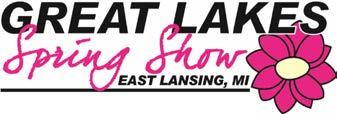
MARCH 20: COWS ~7 PM MARCH 21: HEIFERS ~ 9:30 AM 8:30 a.m.......Showmanship (Age as of day of show) Division 1: 8-12 • Division 2: 13-15 • Division 3: 16 & over
9:30a.m. Great Lakes Spring Show All Breeds Show Alternating classes
ONLY ONE EXHIBITOR PER ENTRY FORM More Entry Forms are Availabe from the MHA Office call: 517-490-7736 (Copies May Be Made of this Entry Form) All exhibitors please use the same entry form. Local Hotel: Red Roof Inn, 3615 Dunckel Rd., Lansing, MI 48910 (800-RED-ROOF or 517-332-2575)
MAIL ALL ENTRIES AND FEES FOR THE GREAT LAKES SPRING ALL-BREEDS SHOW
Michigan Holstein Association 850 Davenport Drive, Waxahachie, TX 75167, Phone: 517-490-7736 Checks made payable to: Michigan Holstein Association
Entries are due March 13, 2020. • Late Entries Close at 4:00 p.m., March 20, 2020 No Late Entries in Show Catalog. All 2020 State Sale animals are eligible to be shown if entered by entry close.
Check In Show cattle may move on Tuesday, March 17 after 6 pm. Remember to have your RFID tags in place before you leave your farm. Check in for show will be... Wednesday, March 18 from Noon-4 p.m. Late check-in will be on Friday, at the immediate conclusion of sale. Additions, deletions and class changes must be made by 4:00 pm on March 20. There is no entry fee for sale animals. If you purchase cattle from the Foundation Sale and want to exhibit, you must enter your animal by or at the IMMEDIATE conclusion of the sale on Friday, March 20.
EXHIBITOR
ADDRESS
CITY STATE & ZIP
PHONE
SIGNATURE
Spring 2020 FAX
DATE
ENTRIES DUE MARCH 13, 2020
No. of Entries ___________ x $25/entry = __________
Dual Red & White ________x additional $10/entry= ________
No. of Late* Entries ___________ x $50/entry = __________ *After March 13, 2020
No. of Extra 5Ft. ___________x $11/5 feet = __________
Total:
Mail entries to: Michigan Holstein Association
850 Davenport Drive
Waxahachie, TX 75167
Breed RW Dual @ $10
ANIMAL NAME
CLASS Number
REGISTRATION NO.
305 PRODUCTION RECORD
SIRE DAM
OWNER
Breed RW Dual @ $10
CLASS Number
ANIMAL NAME
REGISTRATION NO.
305 PRODUCTION RECORD DATE OF BIRTH Open Show Junior Show
DATE OF BIRTH BRED & OWNED
No Yes
SIRE DAM
OWNER
Breed RW Dual @ $10
CLASS Number
ANIMAL NAME
REGISTRATION NO.
305 PRODUCTION RECORD
SIRE DAM
OWNER
Breed RW Dual @ $10
CLASS Number
ANIMAL NAME
REGISTRATION NO.
305 PRODUCTION RECORD DATE OF BIRTH
DATE OF BIRTH
SIRE DAM
OWNER
Breed RW Dual @ $10
CLASS Number
ANIMAL NAME
REGISTRATION NO.
305 PRODUCTION RECORD
SIRE DAM
DATE OF BIRTH BRED & OWNED
No Yes
BRED & OWNED
No Yes
BRED & OWNED
No Yes
MMPA Dairy Farmers Take Home 45 Percent of National Milk Quality Awards
Seventeen Michigan Milk Producers Association (MMPA) dairy farmer members were recently awarded National Dairy Quality Awards by the National Mastitis Council (NMC), making up nearly 45 percent of the total award winners. Honored at the NMC annual meeting in Orlando, Florida last week, these MMPA members were among 38 nationally recognized farms in the annual award program.
Two MMPA farms earned the highest honor, which was granted to only six dairy farms in the U.S. The platinum award winners were Kris and Carla Wardin of Evergreen Dairy in St. Johns, Michigan and Brent, Nancy, Tyler, Ben Wilson of Wilson Centennial Farm in Carson City, Michigan. MMPA farms won seven gold awards, eight silver awards in addition to four honorable mentions.
MMPA offers a portfolio of member services to help members produce the highest quality milk possible, with field representatives working closely with each member to achieve quality goals. MMPA also offers a quality premium incentive for its members producing higher quality milk.
MMPA’s large representation in the NMC National Dairy Quality Award Program underscores the hard work of the cooperative’s farms while competing against other well-performing farmers across the country.
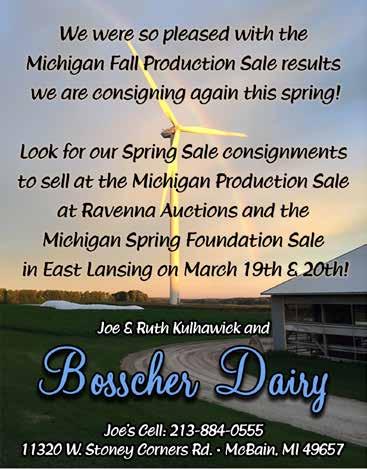
Spring 2020 “MMPA dairy farms have a reputation for producing high quality milk and this year’s representation in the National Dairy Quality Awards is yet another a testament to maintaining excellence,” Ben Chapin, manager of field services said.
The winners were selected from a pool of 82 applicants nationwide. The winning operations stood out for consistently producing high-quality milk. Applications were evaluated for measures of quality, systems of monitoring udder health, milking routine, protocols for detection and treatment of clinical and subclinical cases of mastitis and strategies for overall herd health and welfare. MMPA winners were nominated by their member representatives.
The National Mastitis Council, along with quality partners Boehringer Ingelheim, GEA, Ecolab, IBA Inc., Conewango, milc Group and Hoard’s Dairyman sponsored the awards. The National Mastitis Council (NMC) is a not-forprofit professional organization devoted to reducing mastitis and enhancing milk quality. The NMC promotes research and provides information to the dairy industry on udder health, milking management, milk quality and milk safety.
Platinum Awards
• Wilson Centennial Farm of Carson City • Evergreen Dairy of St. Johns
Gold Awards
• Crandall Dairy Farms LLC of Battle Creek • De Grins Oer Dairy of Blanchard • Van Polen Farms of Marion • Rubingh's Dairyland LLC of Ellsworth • Wirth Farms of Evart • Gross Farm Inc of Weidman • Raterink Dairy Farm of Zeeland
Silver Awards
• Dick Haven Farms LLC - Jersey Operation of McBain • Schultz Dairy LLC of Sandusky • Bosscher Dairy of McBain • Spring Lake Farm of Stanton • Benthem Brothers Inc of McBain • Nienhuis Family Dairy of Zeeland • Bontrager Farm of Wolcottville, Indiana • Leroy Zimmerman of Carson City
25Michigan Dairy Cattle News Honorable Mention
• Higgins Farm of Grant • Ephraim Martin of Sheridan • Dodde Dale Farms LLC of Falmouth • Gilde Farms of Lake City
2020 March 19: Michigan Production Sale, Ravenna Auction, Ravenna, MI March 20: Michigan Spring Foundation Sale, MSU Livestock Pavilion, East Lansing, MI March 20-21: Michigan All-Breeds Show, MSU Livestock Pavilion, East Lansing, MI March 20: Mill Wheel Dairy Show Clinic, MSU Pavilion, East Lansing, MI March 26-29: Spring Dairy Expo, Columbus, OH April 3: Indiana State Sale, 6:30 pm, Columbia City, IN April 3-5: Spring Fling Tag Sale, Lookwell Farm, Elkhart, IN April 8-11: New York Spring Dairy Carousel, Syracuse, NY April 23-25: Wisconsin Spring Showcase, Madison, WI June 11-13: Indiana State Holstein and Jersey Shows, Laporte, IN June 22-26: National Holstein Convention, Lancaster Marriott & Convention Center, Lancaster, PA July 20-24: Michigan Dairy Expo, MSU Pavilion, East Lansing, MI One More Thing... Enter the 2020 Michigan Holstein Association photo contest! It’s easy. Send your high resolution color photo to Suzanne Tuttila at michholstein1@gmail.com and the membership committee will pick a winner. Your photo will be featured in the Michigan Dairy Cattle News! Contact Suzanne for more details.
Rose Stieg of Holger Farms was presented with the UDIM Dairy Promotion Award at the recent Great Lakes Regional Dairy Conference held in Frankenmuth. The full story will be in the next issue of the MDCN!
Our membership issue is coming up! If you want to be listed in the membership directory in the Summer issue, please renew your membership today! Contact Suzanne Tuttila at 517-490-7736 to renew!
Like us on Facebook! Like the Michigan Holstein Association and the Michigan Jersey Cattle Club Facebook pages so you can keep up to date with the activities in the state!
2021 June 21-25: National Holstein Convention, Columbus, OH 2022 June 27 - July 1: National Holstein Convention, Sioux Falls, SD
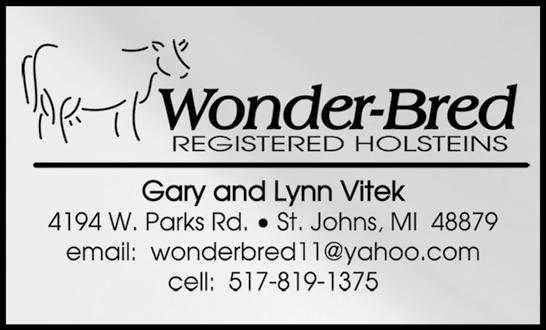
Spring 2020 aAa Weeks (Greg Palen) .................................................................pg. 19 Adam, Mark............................................................................. MW pg. 29 Bosscher Dairy................................................................................. pg. 14 Bovine Beautician............................................................................. pg. 6 Buell’s Bovines................................................................................... pg. 4 Central Star......................................................................................pg. 14 Commodity Blenders, LLC..............................................................pg. 11 Dairy Agenda Today......................................................................... pg. 8 Dawson Jersey Farms....................................................................... pg. 6 GENEX...............................................................................................pg. 28 Green Meadow Farms, Inc. ..................................................... MW pg. 15 Indiana State Holstein Sale.................................................... MW pg. 51 Michigan Spring Foundation Sale ...................................MW pg. 40-41 Mill Wheel Dairy Show Clinic ................................................. MW pg. 34 MMPA ................................................................................................. pg. 2 Pinnacle Genetics.................................................................... MW pg. 45 Posey Creek........................................................................................ pg. 4 Prenger’s, Inc. .................................................................................... pg. 5 Reed Dairy............................................................................... MW pg. 34 Rod-er-Dic Farm...................................................................... MW pg. 39 Silent-b Registered Holsteins................................................. MW pg. 20 Spartan Production Sale.................................................................. pg. 7 ST Genetics.......................................................................................pg. 27 Star-Summit Farm................................................................... MW pg. 43 Starward Farm .......................................................................... MW pg. 6 SunQuest Registered Holsteins ............................................. MW pg. 34 Tomerton Holsteins, Jerseys & Ayrshires ........................................ pg. 4 Tonic Holsteins ........................................................................ MW pg. 29 Wonderbred Holsteins....................................................................pg. 26 Zielland Farms......................................................................... MW pg. 25 index to advertisers
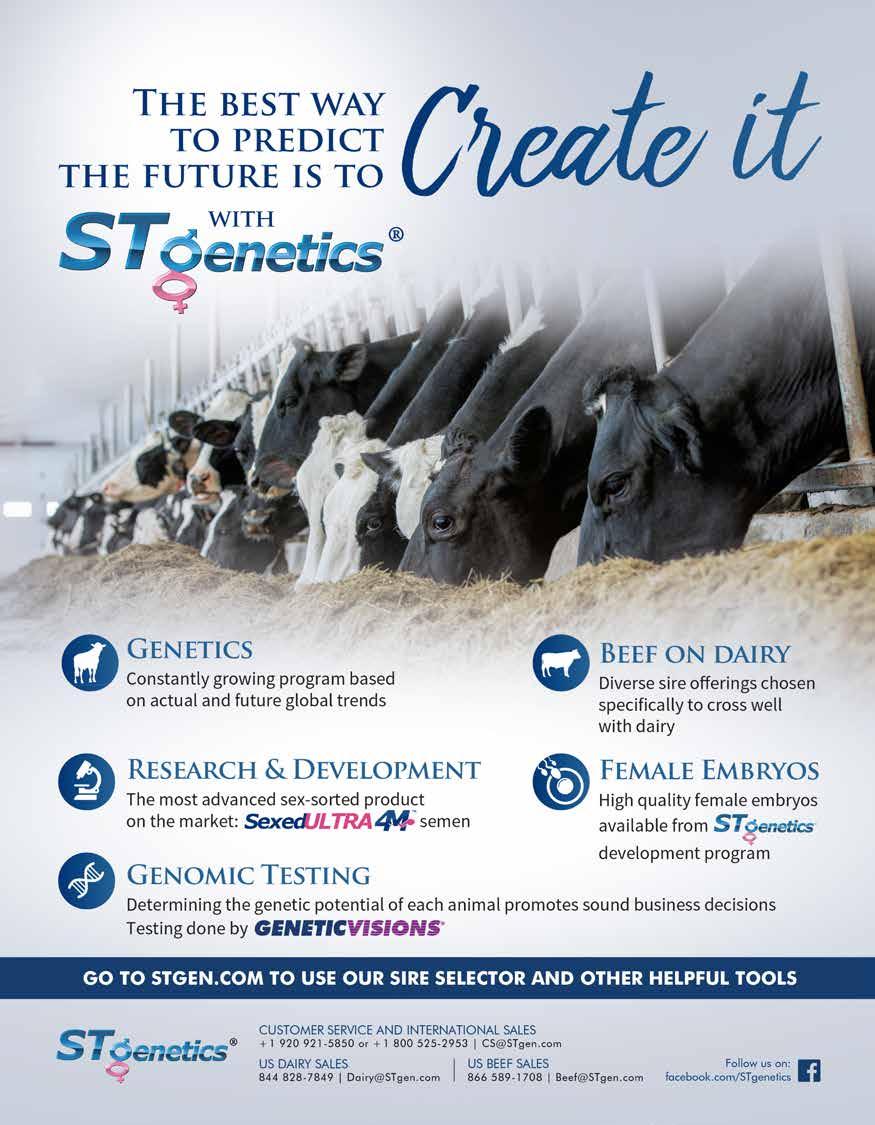
Celebrating 5 Years
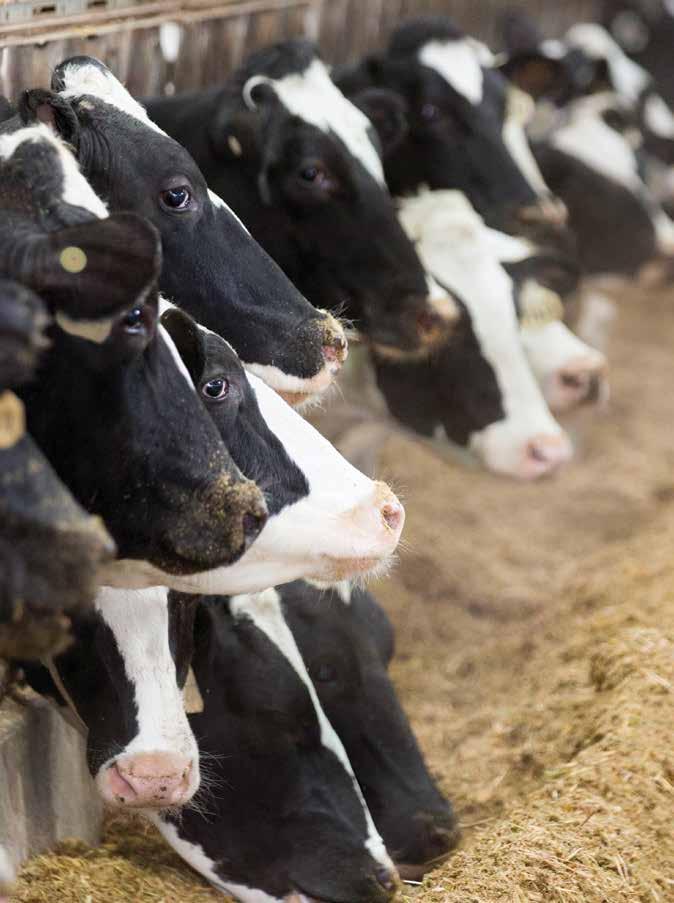
of the ICC$ ™
Index
The GENEX kind of cow is …
High-producing, trouble-free & feed efficient.
FERTILE with GOOD BODY CONDITION and excellent energy-corrected production.
A MODERATELY SIZED COW THAT OUTLASTS OTHERS. The invisible cow.
She’s healthy, trouble free, breeds on schedule and calves in easily.
PRODUCES MILK EFFICIENTLY and adds to your bottom-line profit.
